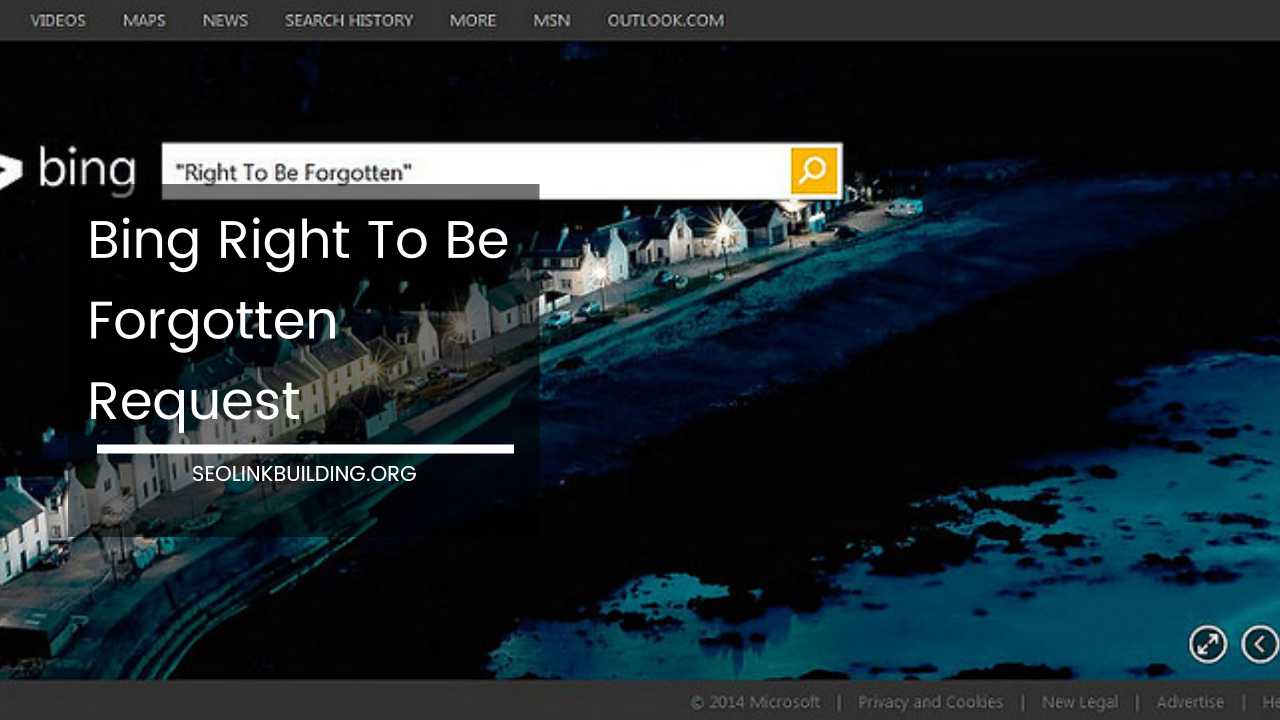Reclaim Your Online Privacy: A Guide to Bing’s Right to be Forgotten

Bing Right to Be Forgotten Request: Reclaiming Your Online Privacy in Europe
The internet revolutionized communication and information access. However, it also created a digital footprint that can linger indefinitely.
For European residents, the General Data Protection Regulation (GDPR) introduced a powerful tool for controlling this online presence: the Right to be Forgotten.
This right empowers individuals to request search engines like Bing to delist links containing their personal information from search results associated with their name.
This article delves into the Bing Right to be Forgotten process, explaining your rights, the factors Bing considers, and alternative strategies for managing your online privacy in Europe.
Understanding the Right to be Forgotten
The Right to be Forgotten, enshrined in Article 17 of the GDPR, grants EU residents the right to request search engines to delist specific URLs from search results for their name. This right applies when the information in question is:
- Inaccurate, irrelevant, or outdated: Inaccurate information can damage your reputation. Irrelevant details, like childhood addresses, may no longer be relevant to your current life. Outdated information, such as job titles from years ago, can create a misleading picture.
- No longer serving a legitimate public interest: News articles about public figures or information relevant to ongoing legal proceedings might serve a public interest. However, personal details from years ago about a minor offense or a resolved dispute may no longer hold such value.
- Causing undue harm to your privacy: Information that exposes you to harassment, stalking, or reputational damage can be grounds for delisting. This could include private photos, revenge porn, or outdated negative news articles.
Is Bing Obligated to Comply?
Following the enforcement of the GDPR in 2018, Bing, along with other major search engines, became obligated to comply with Right to be Forgotten requests from EU residents. This means Bing has a legal responsibility to assess requests based on the GDPR and make informed decisions.
Submitting a Right to be Forgotten Request to Bing
Bing provides a dedicated web form for submitting Right to be Forgotten requests: https://www.bing.com/webmaster/tools/eu-privacy-request. This form allows you to specify:
- Your Name and Contact Information: Bing will use this information to contact you regarding the status of your request.
- The Specific URLs You Want Delisted: Provide the exact web addresses of the content you wish to be removed from search results.
- An Explanation for Why You Believe the Information Should Be Delisted: This is the most crucial section. Clearly and concisely explain why the information falls under the criteria mentioned earlier (inaccurate, irrelevant, or causing undue harm). Be specific about the harm caused by the information’s presence in search results.
Strengthening Your Right to be Forgotten Request
Here are some tips to bolster your request’s effectiveness:
- Gather evidence: Supporting documents like court orders, official corrections, or evidence of harm can strengthen your case.
- Be specific: Don’t just say the information is inaccurate; explain the specific inaccuracies and provide corrections, if possible.
- Focus on privacy harm: Clearly articulate how the information is causing undue harm to your privacy.
- Respectful language: Maintain a professional and respectful tone throughout your explanation.
What Bing Considers When Evaluating Requests
Bing weighs several factors when reviewing Right to be Forgotten requests. Here are some key considerations:
- Nature of the Information: Is it factual or opinion-based? Does it concern a public figure? Opinions and information about public figures generally receive less protection than private information about ordinary citizens.
- Severity of the Harm: How negatively does the information impact your life? Evidence of harassment, stalking, or reputational damage strengthens your case.
- Public Interest: Does the information hold public value, such as news articles about government officials or public events? Public interest information may take precedence over individual privacy in certain cases.
- Timeliness: Recent information typically carries more weight than outdated content.
The Right to be Forgotten Process: What to Expect
Once you submit your request, Bing will acknowledge receipt and initiate a review process. This typically takes several weeks. Bing may request additional information from you or the website hosting the content.
The possible outcomes of your request are:
- Full Delisting: Bing removes the URLs from search results for your name across all EU countries. This is the ideal outcome.
- Partial Delisting: Bing may delist the URLs in some EU countries but leave them accessible in others. This might occur if the information has a stronger public interest in certain regions.
- Rejection: Bing may reject your request if they believe the information serves a legitimate public interest that outweighs your privacy concerns. This could be the case for news articles about public officials, criminal convictions, or information relevant to ongoing legal proceedings.
Appealing a Rejected Right to be Forgotten Request
If Bing rejects your request, you have the right to appeal. The appeals process typically involves providing additional information or arguments to support your case.
Here’s how you can approach an appeal:
- Carefully review the rejection notice: Understand the reasons behind Bing’s decision.
- Gather further evidence: Look for additional documentation to strengthen your claim of privacy harm.
- Refine your argument: Revise your explanation, addressing the specific concerns raised by Bing in the rejection notice.
- Seek legal guidance: Consider consulting a lawyer specializing in EU data protection laws, especially for complex cases.
Beyond Bing: Additional Strategies for Online Privacy
While Bing offers a Right to be Forgotten mechanism, consider these additional strategies to manage your online presence in Europe:
- Contact the website owner: The most effective way to remove information might be to directly contact the website owner or publisher. Many websites have their own procedures for content removal. You can usually find a contact form or email address on the website itself.
- Request content modification: If the information is inaccurate or outdated, you can request the website owner to update it with the correct details.
- Manage your online reputation: Practice good online hygiene by being mindful of the information you share publicly. This includes reviewing your social media privacy settings and being cautious about what information you post online.
- Data Protection Rights Outside the EU: While the Right to be Forgotten is specific to the EU, other regions have introduced similar data protection laws. For instance, the California Consumer Privacy Act (CCPA) grants California residents certain rights over their personal information held by businesses. Research the data protection laws in your region to understand your rights.
Final Thoughts: Reclaiming Control of Your Online Presence
The Right to be Forgotten empowers EU residents to take control of their online identities. Bing provides a mechanism for submitting such requests, but the process is not guaranteed.
Understanding the factors considered by Bing, along with exploring alternative strategies, can equip you to navigate online privacy concerns in Europe.
Additional Resources:
- European Commission – General Data Protection Regulation (GDPR): https://eur-lex.europa.eu/eli/reg/2016/679/oj
- European Commission – Your Rights under the GDPR: https://curia.europa.eu/jcms/upload/docs/application/pdf/2022-12/cp220197en.pdf
- Bing Webmaster Tools – EU Privacy Request: https://www.bing.com/webmaster/tools/eu-privacy-request
Disclaimer: This article provides general information about the Right to be Forgotten and Bing’s process. It is not a substitute for legal advice. If you have specific questions regarding your situation, consult a lawyer specializing in EU data protection laws.













